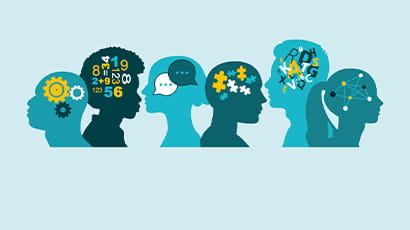Neurodivergence and mental health study support
If you are a student with specific learning differences, such as dyslexia, dyspraxia, ADHD, you are autistic or your studies are affected by mental health, support is available.
The Access and Learning Strategies team
The Access and Learning Strategies (ALS) team are specialist practitioners in neurodivergence and mental health, working as part of the Library's Learning Hub.
We offer a range of services including groups, workshops, drop-ins and one-to-one support, along with neurodiversity screening.
Who we support
You might be curious about neurodiversity, think you may have traits of specific learning differences or autism, or feel that your studies are being affected by mental health. A formal diagnosis is not needed to access ALS resources and support.
Neurodivergent students
Everyone thinks and learns differently. The diversity of human thinking should be celebrated! Neurodiversity comes from the words neurology and diversity. People’s brains are different, so people experience and interact with the world in different ways.
The term neurodivergent means thinking and experiencing the world differently from the 'average' or 'neurotypical' person.
Students with specific learning differences
Specific learning difference (SpLD) is a commonly used term to refer to a group of neurodivergent profiles including:
- dyslexia
- dyspraxia
- dyscalculia
- attention deficit hyperactivity disorder (ADHD) – this is sometimes seen as a mental health condition.
The university environment can be challenging for students with SpLDs as they may be expected to perform in ways which do not fit their learning differences.
Autistic students
Autism is a spectrum condition that affects how individuals communicate and experience the world around them. Autism affects people in different ways and whilst autistic people will share some similar characteristics, everyone will experience different strengths and challenges.
Students whose studies are affected by mental health
We all have mental health, sometimes it is good or at times, it is not great. You may also have a diagnosed or undiagnosed mental health condition. The university environment can impact your mental wellbeing. This can affect your personal life and the ability to manage the demands of your studies.
ALS events
If you have attended one of our events and would like to leave us some feedback, please complete this short feedback form.
ALS events

Wed 21 January 2026, 11:00
Neurodiversity: Reading tech and strategies
Online
Explore ways to help you read more efficiently.

Tue 27 January 2026, 15:00
Autism support group
Room 0C1 Publishing Lab, Bower Ashton Campus
If you identify as autistic, you may like to join our friendly group for autistic students.

Wed 04 February 2026, 15:00
Autism support group
Student Life Hub, Wallscourt Park, Frenchay Campus
If you identify as autistic, you may like to join our friendly group for autistic students.

Tue 24 February 2026, 15:00
Autism support group
Room 0C1 Publishing Lab, Bower Ashton Campus
If you identify as autistic, you may like to join our friendly group for autistic students.

Wed 04 March 2026, 15:00
Autism support group
Student Life Hub, Wallscourt Park, Frenchay Campus
If you identify as autistic, you may like to join our friendly group for autistic students.

Tue 28 April 2026, 15:00
Autism support group
Room 0C1 Publishing Lab, Bower Ashton Campus
If you identify as autistic, you may like to join our friendly group for autistic students.

Wed 06 May 2026, 15:00
Autism support group
Student Life Hub, Wallscourt Park, Frenchay Campus
If you identify as autistic, you may like to join our friendly group for autistic students.
What support do we offer?
We offer workshops, groups, drop-ins, one-to-one study support sessions and online resources.
We aim to meet your individual needs by building your confidence, capability and understanding of how you learn best.
Workshops
We offer in person and online workshops on topics such as quick wins for studying with neurodiversity and reading strategies and technologies.
Drop-ins
We offer regular drop-in sessions at our campus libraries. You don’t need to book, just drop-in with your study-related question and a specialist practitioner will help or signpost you to further resources. View drop in sessions (UWE Bristol login required).
Specialist study skills support
We offer online and in-person one-to-one, specialist study support for neurodivergent students.
Specialist mentoring
We offer online and in-person one-to-one, specialist mentoring for neurodivergent students and students with mental health needs.
Resource space
You can access our set of workshop materials and other useful resources on our online resource space (UWE Bristol login required).
Monthly newsletter
View our monthly newsletter to keep up to date with our upcoming events, topics on neurodiversity or mental health, and learn about free apps or tech solutions to help with studies.
ADHD group
Do you have a diagnosis of ADHD or have you attended a neurodiversity screening at UWE Bristol and have attention difficulties? Would you like to:
- understand a diagnosis of ADHD better?
- find and use your strengths to engage in study?
- explore new strategies, behaviours and study skills?
- try something new and meet like-minded peers?
Book an online ADHD workshop through the events above or find out about our ADHD psychoeducational programme.
Autism Support group
If you identify as autistic, you may like to join our friendly group for autistic students.
The group meets at Frenchay and Bower Ashton Campuses and offers a safe place to meet other students where you are free to be yourself. The group is facilitated by specialist mentors to support your student journey and answer any questions you may have.
You can book your place in advance through the events listed above or just turn up on the day.
For further information, or if you would like to sign up to meeting reminders, please email the Autism Support group at as.group@uwe.ac.uk.
Additional support
Library services for disabled users
Services to support disabled students are available at all UWE Bristol campus libraries. This includes help with assistive technology, alternative formats and assistance using library spaces and resources.
Wellbeing service
Get the support you need for your mental health and personal development. From counselling to mental health support, self-help resources and more.
Neurodiversity screening and assessment
If you already have evidence
If you have evidence, please email it to sae.admin@uwe.ac.uk. We can check through your evidence and advise on your next steps. Your evidence could be:
- You received study support and/or exam adjustments in school/college e.g. extra time in exams
- A previous screening or diagnostic assessment
- You are on a waiting list for an autism or ADHD assessment with the NHS
If you do not have evidence but want to access similar adjustments that you previously received, please complete our questionnaire, which is your first step in our screening process.
Curious about neurodiversity guide
Access the Curious about neurodiversity guide
The Curious about neurodiversity guide contains information about specific learning differences, such as dyslexia, dyspraxia and dyscalculia, ADHD and autism.
It will help you explore your strengths and any traits of neurodivergence. It also contains information about resources and support available at UWE Bristol.
If you are finding study difficult, the guide will direct you to a neurodiversity screening where you can explore signs of SpLD or signs of autism.
If a member of staff at UWE Bristol has recommended you have a screening with us, please complete our questionnaire.
Assessment for specific learning differences
A formal diagnosis is not necessary to access ALS resources and support. However, a diagnostic assessment for SpLD might be right for you if you are looking to apply for Disabled Students’ Allowances (DSA) or your evidence has been rejected for DSA. Please email us at sae.admin@uwe.ac.uk to enquire about an assessment.
If you’ve not been previously assessed, one option may be to consider having a diagnostic assessment.
We can help you explore this and your first step is to use our Curious about Neurodiversity guide.
Assessment for ADHD or autism
If you are experiencing difficulties which might be due to ADHD or autism, please talk to your doctor for advice. A medical diagnosis is required for you to get prescription medication for ADHD.
If you are on an NHS waiting list for an ADHD or Autism assessment:
- email any evidence to the Access and Learning Strategies team at sae.admin@uwe.ac.uk. We will provide you with information on further support, adjustments and resources available to you
- apply for DSA funded study support, if eligible. Submit the DSA evidence form confirming you are on a waiting list for an assessment and provide evidence of any other disabilities and/or long-term medical conditions, with your DSA application.
You may find it useful to visit the following websites for more information:
ADHD
Autism
Useful resources
- Neurodiversity reading list: A reading list for anyone who wants to learn more about neurodiversity.
- Dark mode browser extension: Change the theme of any webpage to ‘sepia’ or ‘dark’ for a more comfortable reading experience.
- Dyslexia Toolbox browser extension: Change the font of any webpage to ‘OpenDyslexic’ or use the mask tool to focus on a portion of text.
- Accessibility tools for neurodiversity: Make content accessible when using Microsoft Windows and Office tools.
Contact us
The ALS administration team office hours are Monday to Thursday 09:00–17:00, Friday 09:00–16:30.
To book a Signs of SpLD/ADHD/Autism screening:
For general ALS enquires:
- Email: sae.admin@uwe.ac.uk
To talk to our practitioners about study related questions:
- Attend a drop-in to talk to an ALS practitioner
Live chat
For quick replies or to book specialist study skills/mentoring, we are here 12:00 to 14:00 Monday to Friday. Chat to us live.
You may also be interested in

Reasonable adjustments
We are committed to putting in place reasonable adjustments to different aspects of your learning if you need them.

Book your DSA Study Needs Assessment
The application and assessment process to access Disabled Students' Allowances (DSA).

English language
Find out about English language and grammar support for students at UWE Bristol.

College study support
College-specific online study support and one-to-one help tailored for your subject.
